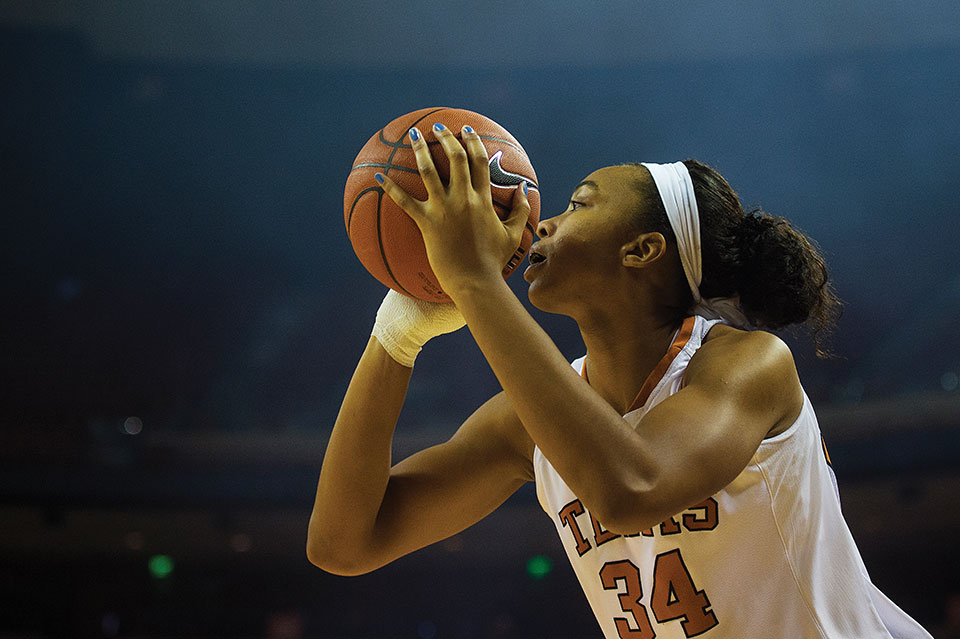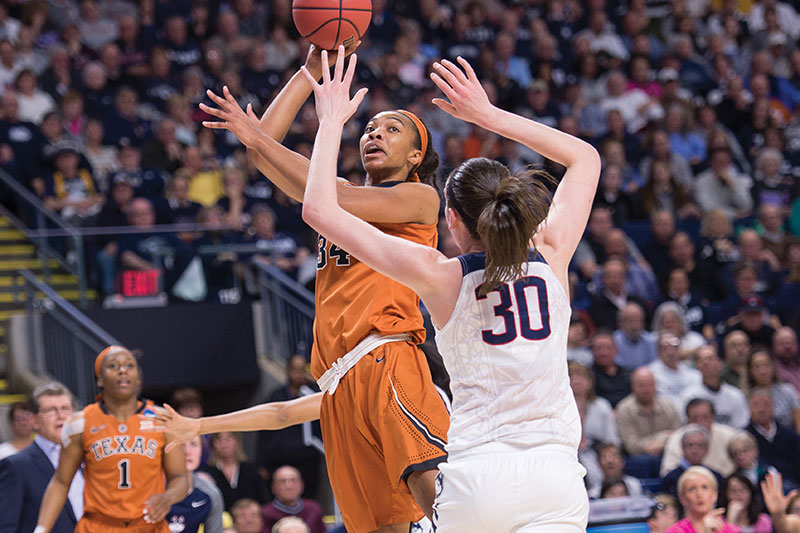Hoops and Hope

How Imani McGee-Stafford is using her voice, her story, and her platform to help children.
These days, Imani McGee-Stafford, former UT Women’s Basketball player and professional basketball player for the Atlanta Dream has a full schedule. Currently, she’s in-season which involves practice, games, and travel. She’s also in the process of setting up Hoops and Hope, her non-profit foundation that advocates arts and athletics for youth.
“It’s like my little child—I’m so excited about it,” she says.
It’s been a long road for McGee-Stafford to get to this point, though. Several years ago, she didn’t even want to be alive.
McGee-Stafford grew up in an abusive home.
“I hate saying that,” she says. “It makes my parents seem like terrible people when they aren’t.”
Her parents separated early in her life, she watched them go through a messy and public divorce and custody battle. After her father remarried, beginning at age eight McGee-Stafford was sexually abused by her stepbrother, which continued for another four years. Repressing the experience, she didn’t tell anyone, not even her dad. Her only forms of escape were basketball and poetry.
The longer she kept her secret, the deeper McGee-Stafford’s sank into depression. By the time she started high school, she was severely depressed. She tried running away and attempted suicide three times. She was finally hospitalized after her third attempt, yet McGee-Stafford still continued to hide the scars of her past.
It wasn’t until she came to the The University of Texas at Austin to play basketball at 18 that she was able to confront her demons.
“Texas was the beginning of my healing,” she says. “Karen Aston had a similar story to mine which really helped.”

UT provided professional care and counseling, as well as relieved the burden of the copious medical bills. The university also allowed McGee-Stafford be both an artist and an athlete, giving grace for missed practice or workouts for poetry competitions.
Growing up, McGee-Stafford found therapy in the form of writing.
“Poetry does everything for me,” she says. “It gives me the ability to use my voice to communicate how I’m feeling and share my story.”
As a student at Texas, McGee-Stafford began performing her poetry around Austin, and joined a competitive slam poetry team. This allowed for her to open up about the abuse and depression to her family, teammates, and the rest of the world.
“Sharing my story sort of happened by accident,” she says.
When the The Longhorn Network approached McGee-Stafford about her story she thought it would be about her and her involvement in slam poetry and being an artsy athlete. It premiered first on LHN, and then later on ESPN.
“It ended up being more serious than I thought,” McGee-Stafford says. “At first I regretted it. My deepest darkest secrets were now out in the open. But then more and more people started approaching me and telling me how I had basically just told their story—growing up I thought I was the only one who had gone through this. I want my story to help people know they aren’t alone and create a safe space for them to share. I think I found my life purpose.”
.jpg)
How Texas Athletics allowed McGee-Stafford to be both an artist and athlete, her non-profit, Hoops and Hopes will advocate for youth to pursue both arts and athletics.
“Sometimes I think we force kids into choosing between arts and sports,” she says. “It doesn’t have to be that way.”
Along with providing a means for artistic expression and athletic opportunities, she wants the foundation, which is set to be up and running in September, to be a safe space for youth to have hard but important conversations. She plans to host panel discussions with professionals and psychiatrists that dive deeper into mental health, sexual abuse, and what healthy relationships should look like.
“We are a reactionary society, and sometimes we only respond to symptoms rather than actually deal with the problems,” McGee-Stafford says. “We need to have more open spaces to educate and open up about these topics. Kids are dealing with serious adult issues at a young age, and they think they have to deal with them by themselves. They don’t understand what healthy relationships look like…I really hope I can make a change.”






